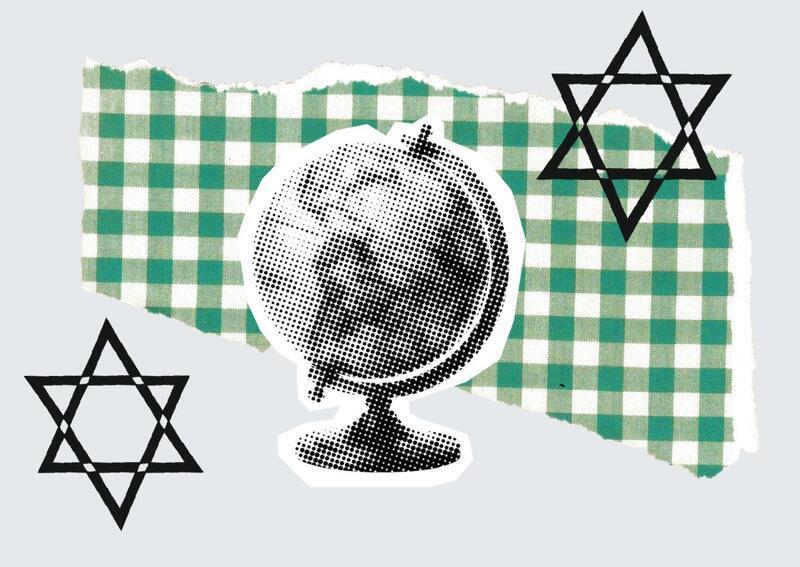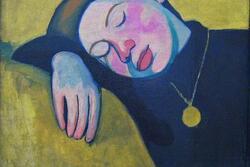Confessions of a Super Jew
Step in if you’ve ever felt not Jewish enough.
It was the last day of the August retreat for the Jewish Women’s Archive’s Rising Voices Fellowship, and most of the questions in the survey up until then had been softballs (step in if you’re an only child and so on). But three straight days living outside of patriarchy at the retreat had me feeling fearless.
I thought about all the silent amidahs that I had spent desperately schuckling and muttering, hoping no one would notice I was on the wrong page and had no idea what I was doing. I thought about being the only girl wearing pants at the yeshiva where I took the Sunday SAT. So, I stepped in.
So did every single other fellow. We looked around, giggled, then stepped out. Next question.
Step in if you’ve ever felt too Jewish.
Again, we all stepped in.
The Rising Voices Fellowship strives to create a community of pluralism. Some Fellows might rarely go to synagogue; others might be the daughter of a rabbi. We might be from Tel Aviv, Massachusetts, Beijing, Houston, or Toronto. We might have entire sections of Talmud memorized, or still not really know what the Talmud is. Yet all of us have felt, at some point or another, that our kind of Judaism was the wrong kind. I’d like to say I was surprised, but the exercise confirmed something I'd suspected for a long time.
Over and over, I’ve heard women undermine their Jewishness. They’ll call themselves “Jew-ish,” using the “ish” to emphasize all that they feel they are not.
“I’m not that Jewish,” they might say. Or, “I’m no ‘Super Jew.’”
Since kindergarten, I’d struggled to fit in at the non-Jewish public schools I attended. Essential parts of my classmates' lives (Christmas Eve, the Easter Bunny) were missing in mine, while things as familiar to me as kashrut and the High Holidays they had never heard of. I compensated by making Judaism the focal point of my identity, for which I often felt humiliated and alienated.
In elementary, middle, and eventually high school, I leaned the other direction, blaming my Judaism in part for my social isolation. I learned, slowly but surely, the tight-rope act of downplaying my Judaism in non-Jewish spaces. I’d subconsciously count the number of times I mentioned being Jewish per day, and when the number got too high, I’d make myself stop.
Even so, I could see that, to everyone around me, I was the “Super Jew.” I was the person who they asked when they didn’t know a Jewish holiday, or the person they went to in order to soothe their guilt about a family member’s casual antisemitism.
I found that people who positioned themselves as “less Jewish” than me constantly wanted to talk about it. They were dating someone who was Jewish, and wanted to let me know. They had heard that Hitler was actually Jewish, and wanted to let me know. (This is a myth). They had just gone to a bat mitzvah/Hebrew school/Yom Kippur service/anti-Israel rally/pro-Israel rally, and wanted to let me know. They hated all Orthodox Jews — a direct quote — and wanted to let me know.
Maybe they didn’t know that Judaism was, like most things, expansive and impossible. That anyone could feel “not Jewish enough” — for not knowing Hebrew, for not doing Daf Yomi, even for not having watched Fiddler on the Roof.
It can be difficult to be unapologetically anything. Anyone who has experienced the world as a woman knows this. We are taught that we take up the wrong amount of space—we’re too loud or too quiet, we need to be more assertive or we need to chill out. We run from the labels given to women that are “too much:” The Angry Feminist. The Angry Black Woman. And, sometimes, the Super Jew.
The myth of the Super Jew is a double-edged sword. It shames everyone who is “Jewish enough” just as much as it shames everyone who isn’t. Each time someone told me that they weren’t that Jewish, all I could hear was what their judgment for everyone who was. Their judgment for me.
On the other hand, it implies that there’s a single right and wrong way to be Jewish. Really, there’s no such thing as not Jewish enough. Pirkei Avot teaches that the wisest of us learn from everyone; there is nothing more Jewish than having more to learn. As Jewish women, we cannot let our imposter syndrome keep us from learning more.
In a world where many of us could pretty easily leave our Jewishness behind, we are all Super Jews. I lead a life filled with Jewish meaning, and I shouldn’t have to untangle that from the other identities I hold. In the VeAhavta, a prayer traditionally said twice a day following the Shema, we are commanded to love God with all our heart, soul and strength. To me, this means coming to terms with the fact that, for better or for worse, I bring my “Super Jew” self everywhere I go. When I raise my hand in class, it’s because I learned from Passover seders and Beit Midrash study sessions how to be curious. When I sing in my school musical, it’s because I learned from nigunim (wordless songs of prayer) and Shabbat morning services how to use my voice.
So yes, I stepped in because I was “too Jewish,” and because I was “not Jewish enough.” I stepped in because I am equal parts “Bad Jew” and “Super Jew.” Chances are, if you’re reading this, that you probably are too. But let’s be honest. Who isn’t?
This piece was written as part of JWA’s Rising Voices Fellowship.







This is beautiful! I think one can be 100% proud Savta and at the same time 100% proud Jew. They overlap. You are wonderful!